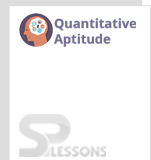 Introduction
Introduction
What is Quantitative Aptitude test?
Quantitative Aptitude is one of the prominent competitive aptitude subjects which evaluates numerical ability and problem solving skills of candidates. This test forms the major part of a number of important entrance and recruitment exams for different fields. The Quantitative Aptitude section primarily has questions related to the Simplification, Numbering Series, and Compound Interest, etc.
A candidate with quantitative aptitude knowledge will be in a better position to analyse and make sense of the given data. Quantitative Aptitude knowledge is an important measure for a prospective business executive's abilities.
The article IBPS RRB PO Quantitative Aptitude Quiz 1 provides Quantitative Aptitude questions with answers useful to the candidates preparing for Competitive exams, Entrance exams, Interviews etc. IBPS RRB has released IBPS RRB Officer 2019 Official Notification for Officer Scale(I, II, and II). Quantitative Aptitude plays major role to qualify examination. The article IBPS RRB PO Quantitative Aptitude Quiz 1 will assist the students to know the expected questions from Quantitative Aptitude.
Click Here for Official IBPS Website
 Quiz
Quiz
Q1. One type of liquid contains 20% water and the second type of liquid contains 35% water. A glass filled with 8 parts of the first liquid and 5 parts of the second liquid.The water percentage in the new mixture is
-
A. 25.75
B. 25.76
C. 25.67
D. 25.56
-
A. 50
B. 60
C. 70
D. 80
-
A. 10.20
B. 10.22
C. 10.24
D. 10.25
-
A. 20%
B. 30%
C. 40%
D. 50%
-
A. 400
B. 500
C. 440
D. 540
Q1. The digits of a two-digit number are in the ratio of 2 : 3 and the number obtained by interchanging the digits is bigger than the original number by 27.What is the original number?
-
A. 63
B. 48
C. 96
D. 69
-
A. 13
B. 3
C. 16
D. 11
-
A. 4236
B. 4306
C. 4336
D. 5336
-
A. 18, 22 and 23
B. 18, 19 and 20
C. 19, 20 and 21
D. 20, 21 and 22
-
A. 36
B. 40
C. 45
D. 50
1. A total of 960 rupees is given to three people A, B and C. A and B together can complete 7/12 and C and B together can complete 5/12. So, how much amount should be given to A.
- A. 360
B. 460
C. 280
D. 660
- A. 8hrs
B. 7hrs
C. 9hrs
D. 11hrs
- A. 15
B. 20
C. 25
D. 40
- A. 36 days
B. 42 days
C. 30 days
D. 28 days
- A. 7 days
B. 10 days
C. 5 days
D. 12 days





